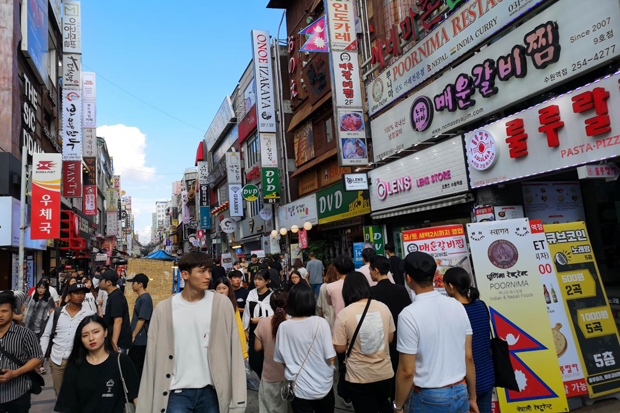
Thai workers are expected to travel in droves to South Korea which is welcoming back foreign workers without quarantine requirements.
The Labour Ministry has negotiated a new opening for the Thai labour market there and is urging those interested in jobs in the industrial sector to sharpen their skills and prepare for tests.
South Korea's shipbuilders are looking to hire more skilled labour to meet a shortfall, and their government has increased the quota for migrant workers by 20% with Thai workers being one of their main target groups.
Labour Minister Suchart Chomklin says there are more job opportunities for Thai workers in South Korea following his visit last month in which he discussed the issue with Minister of Employment and Labour Lee Jeong-Sik.
Raised during the talks were ways to increase employment opportunities for Thai workers including raising the age bracket. Currently those employed through the Employment Permit System (EPS) must be between 18 and 39.
A Seasonal Worker Program (SWP) in the agricultural sector was also raised during the meeting, he said, adding that a memorandum of understanding is expected to be signed soon.
According to the minister, the SWP is implemented by South Korea's local governments to alleviate labour shortages in the farming and fishing sectors. The harvest season lasts from March to October.
The Korean side has proposed the ministry collect 70,000 baht from each worker as a guarantee that labourers will honour their short-term contracts. However, the practice is not allowed under Thai labour law and measures will be worked out to help Thai workers secure jobs.
"For the South Korean market, it is clear there are more job opportunities in the shipbuilding industry. There is high demand for welders, electricians and painters, estimated about 10,000 jobs per year," said the minister.
Bogus job offers
Amid the opportunities, concerns remain among Thai authorities: job scammers have sprung into action and are preying on unsuspected job seekers using social media platforms.
Mr Suchart said the Labour Ministry is working closely with the Royal Thai Police's Anti Trafficking in Persons Division (ATPD) in taking legal action against people who dupe others into paying recruitment fees for non-existent jobs.
Pairoj Chotikasathien, director-general of the Department of Employment, said fake job offers are rampant and many advertisements by recruitment firms may be in violation of the employment and protection law.
Recruiting people for jobs overseas without permission is liable to a penalty of three to 10 years in prison and/or a fine between 60,000 and 200,000 baht. Job ad placements without permission are also liable to a maximum prison term of three years and/or a maximum fine of 60,000 baht.
A total of 101 people have been arrested and charged in connection with illegal job placement schemes which snared 136 victims and caused financial damage estimated at 11.5 million baht, he said.
However, many Thais are believed to consider a shortcut: disguising themselves as tourists to enter the country and working there illegally.
Based on figures provided by the South Korean embassy in Thailand, as of December last year a total of 18,221 Thai nationals were legally employed while the number of illegal workers known as phi noi or "little ghost" was estimated to be at about 140,000.
Worth the risk
Mongkol Phairoh, a core member of the network supporting Thai workers overseas, said the labour market overseas especially in South Korea is bursting with activity now the Covid-19 pandemic is easing.
However, while many have enrolled in language schools to secure jobs via the EPS, others, particularly those aged 18-24, have decided to become "little ghosts" because they do not want to be on a waiting list, he said.
A language proficiency test is one of the requirements for Thai workers seeking employment in South Korea, and despite passing the exam many have to wait two years to get employment contracts.
"They will lose 30,000 baht if they are rejected entry. But they think it is worth it if they are allowed to enter. They're willing to take the risk because pay is high," he said.
Based on information from illegal Thai workers in auto spare parts factories and food vending, business operators are paying them more than legal workers, though the reason is unclear, he said.
He said illegal job brokers demand 40,000 baht in exchange for their services if the job seekers can enter South Korea and those interested are required to pay an advance of 10,000 baht.
"Some businesses turn a blind eye to illegal migrant workers because they need labour," he said.
However, with the Korea Electronic Travel Authorization (K-ETA) registration in place, "little ghosts" will face a hard time getting through immigration, according to Mr Mongkol.
Screening little ghosts
South Korea is a popular holiday destination among Thais but many find themselves rejected entry as part of stepped-up measures against those exploiting tourist visas.
The K-ETA system helps screen tourists from countries granted visa exemptions and includes an app tourists must use before entry. Launched in September last year, the system has applied to Thai visitors since April.
Visitors must submit details at least 24 hours before their flight and obtain permission to visit before departure. Even so, they still face screening by immigration upon arrival.
A source at the Royal Thai Police said 10,253 Thais have been sent home from South Korea this year. Half were found to be overstaying their visas and the other half were denied entry.
A total of 9,030 Thais were sent home in 2020 and 3,664 last year.
In many cases visitors are denied entry when unable to list their cities of destination or if they are not carrying enough cash as required by immigration.
According to the source, based on the number of flights between Thailand and South Korea, about 400 Thais travel to South Korea on a daily basis.